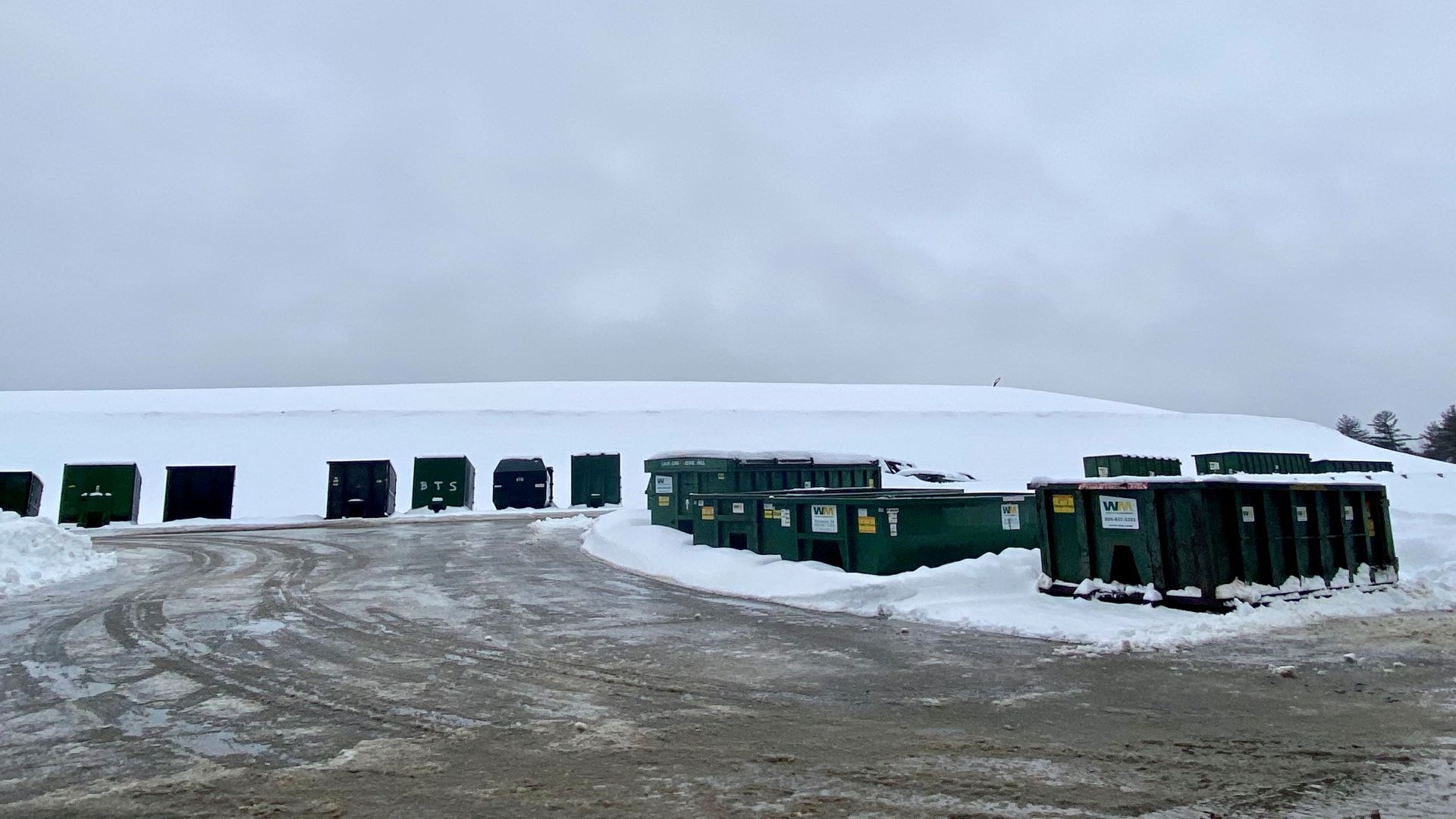A 48-acre expansion of the Crossroads Landfill in Norridgewock is set to move forward after the Maine Board of Environmental Protection in late January denied an appeal by the Conservation Law Foundation that would have halted or altered the project.
The Law Foundation had asked the board to reverse the final licensing decision of the Maine Department of Environmental Protection, which approved the expansion last May, or modify it to include a number of requirements. The board rejected both requests, saying that the landfill owner, Waste Management, had met the licensing requirements.
While board member Robert Duchesne said some of CLF’s ideas were good ones, most “are policy decisions that aren’t ours to consider.”
Although the least desirable disposal option, landfills remain a necessary part of the waste hierarchy, particularly as Mainers have generated trash at increasingly high rates in recent years.
In 2017, residents disposed of 1,080 pounds of trash per person. That increased by 17% to 1,260 pounds per person in 2019. The state continues to struggle to meet recycling targets, with communities scrapping or cutting back programs as costs increased.
Maine has roughly 40 operating landfills, nine licensed to accept municipal solid waste. One of the nine, the Brunswick Graham Road landfill, closed last year. Another, Hatch Hill landfill in Augusta, is expected to be full in five years. Without the expansion license, Crossroads is projected to run out of space within a year or so, according to the most recent DEP report.
Crossroads, the state’s only commercially owned landfill, has taken in more waste than anticipated since 2019, after the Coastal Resources of Maine facility in Hampden was delayed and ultimately shut down due to funding and other issues. It has yet to restart.
Slightly less than a third of the waste coming into the Crossroads facility is from out of state, another point of contention for expansion opponents, who say capacity should be reserved for in-state waste. The landfill is allowed to have up to 35% of its general waste come from out of state. Federal law prohibits Maine from restricting out-of-state waste at commercial facilities.
Conservation Law Foundation had requested that the DEP cap the amount of out-of-state waste being buried in the expansion area each year or set aside a specific amount for Maine waste. The group also wanted Waste Management to be required to pretreat leachate for PFAS, the “forever chemicals” and expand its recycling and composting programs, among other requests.
Per- and polyfluoroalkyl substances (PFAS) are typically referred to as “forever chemicals” because they are found in a wide range of products and are so stable that they stay in the environment for decades without breaking down. They have been linked to a number of health problems.
One of the most important requirements the group had sought, said Peter Blair, an attorney with CLF, was that DEP require Crossroads to use a double-liner system to line the expansion.
“No other state in New England would consider developing a landfill of this size with a single-liner system,” said Blair. Several other New England states, including New Hampshire and Massachusetts, require double-liners. Waste Management has used double-liners elsewhere on the Crossroads site.
But department staff said the design of the liner system, which consists of a layer of clay, a plastic liner and drainage material such as sand or gravel upon which trash will be piled, met requirements and that it was satisfied with the company’s plans to monitor for leaks.
Maine required double liners from 1989-98 in certain landfills but dropped the requirement after determining that “improved and consistent material manufacturing technology” meant single liners were “robust enough to mitigate the potential for leaks,” and detection systems showed they weren’t leaking, DEP Deputy Commissioner David Madore wrote in an email.
Neighbors raise concerns over PFAS
The landfill expansion, which is expected to provide an additional 15-17 years of capacity, has been the subject of controversy among neighbors since it was proposed in 2018.
In public hearings, some said Crossroads had been a good and responsible neighbor, supporting local programs and the tax base.
“Based on everything I’ve done, everything I’ve observed, everybody has to tow the mark,” said Jeff Lloyd, president of Merle L. Lloyd and Sons in Anson, who has worked as a subcontractor with the company, during a public hearing. “There is no compromise with safety, the environment or in resource protection.”
Others argued that the expansion would create new capacity for out-of-state waste and endanger nearby water supplies, including the Kennebec River. The license does not require Waste Management to test or treat runoff from the landfill for PFAS, even though the company is allowed to take in sludge from in- and out-of-state sources. Crossroads accepted 22,675 tons of sludge in 2020, much of it from out of state, according to the DEP. That amounts to roughly 6% of the total waste received at Crossroads.

Documents obtained by The Intercept in 2019 found that all sewage sludge tested by the Maine DEP contained PFAS. Since then, several Maine farms that used sludge as fertilizer were forced to shut down after finding high levels of the chemical in their products, including milk and beef. Maine lawmakers are considering an amendment to a bill, LD 1911, that would ban the sale or distribution of compost that contains sludge and allow the DEP to require anyone licensed to discharge wastewater to test it for PFAS.
“New landfills being licensed in (New Hampshire) and (Vermont) are subject to much more significant testing and treatment requirements of leachate for toxins, including PFAS/PFOS,” wrote Athens resident Hillary Lister in public comments on the Crossroads expansion. “Lack of requirements for treatment of the leachate in Norridgewock increases risks of contamination both to groundwater supplies and surface waters.”
Vermont is studying ways to treat PFAS in leachate but has yet to issue guidelines. A 2020 report found that while there are ways to remove them from runoff, the treatment options create their own concentrated PFAS byproduct. That byproduct can either be landfilled, making sure it is well-contained to prevent it seeping back into the environment, or burned, which could create problems with air emissions.
New Hampshire attempted to put in place first-in-the-nation requirements for leachate testing for PFAS, but a judge halted the rules. That case is making its way through the courts.
The Maine DEP has found the chemicals — used in everything from nonstick pans to waterproof jackets — in “measurable levels” in fish in the Kennebec River. The highest levels were found in fish below the Shawmut Dam in Fairfield, which is downstream from the Sappi wastewater treatment plant, where Waste Management sends much of its leachate for treatment before it is released into the Kennebec.
Although the chemicals were elevated in fish found closer to industrial and biosolid spreading sites, they were “well below” the levels the Maine CDC would advise against eating the fish, according to the DEP.
Officials: Too soon to require PFAS treatment
Although concerns over PFAS abound, several board members and DEP Commissioner Melanie Loyzim said at a hearing in late January that it was simply too soon to require Waste Management to pretreat leachate for the chemicals because guidelines are still being developed.
“This is very much a live discussion,” said Loyzim.
In October 2020, the department began requiring landfills to test leachate for PFAS twice annually through 2023. The information will be used to inform a report the DEP plans to submit to the Legislature in January 2024 with the testing results and recommendations, including proposed legislation.
Maine lawmakers are considering a bill, LD 1875, that would require state-owned landfills to treat leachate for PFAS prior to sending it for disposal or ensure the receiving facility can reduce the concentrations. Those regulations, if passed, would not apply to Crossroads, the state’s only privately owned landfill.
Waste Management does have an on-site treatment option for PFAS at its Turnkey facility in Rochester, N.H. That facility came under fire in 2019 for shipping wastewater with high levels of PFAS to treatment plants in Massachusetts and Maine, including to the Anson-Madison Sanitary District, which also treats leachate from Crossroads.
Blair, of the Conservation Law Foundation, said the board’s rejection of its requests, particularly around PFAS treatment and the double-liner, means Maine’s landfill regulations are in need of “significant upgrades.”
“The regulations set what we think is an unnecessarily low floor,” said Blair. “This mountain of trash will be there forever.”








